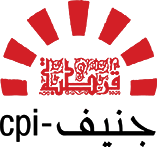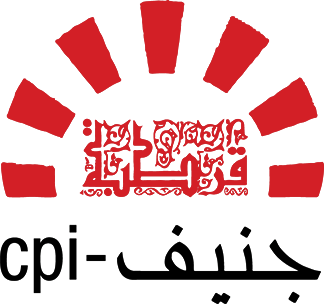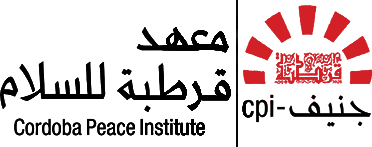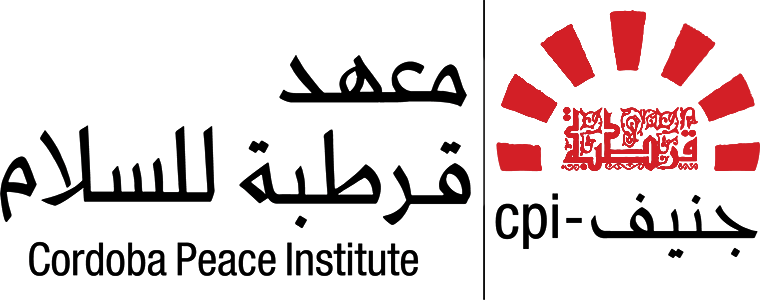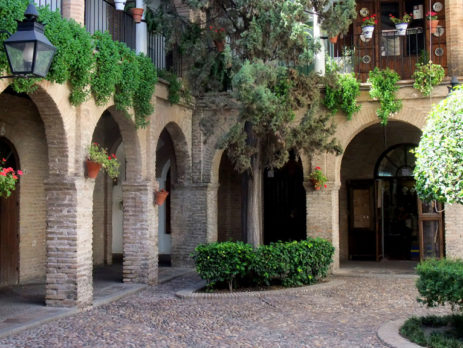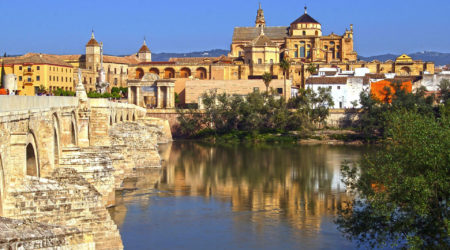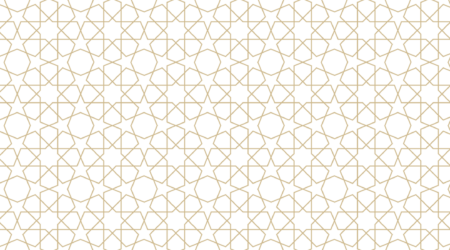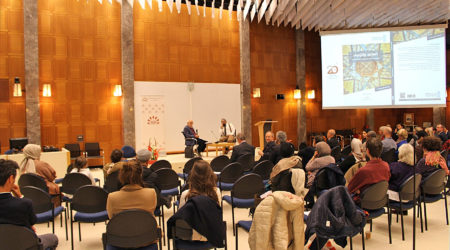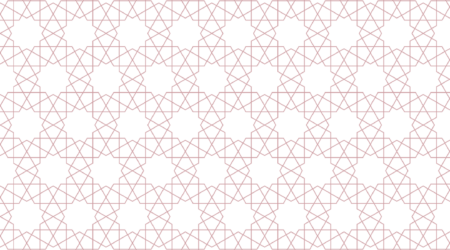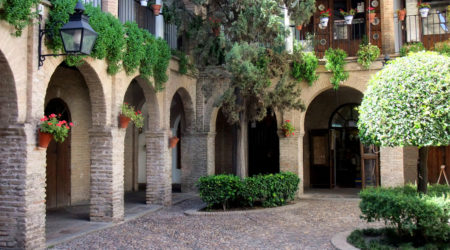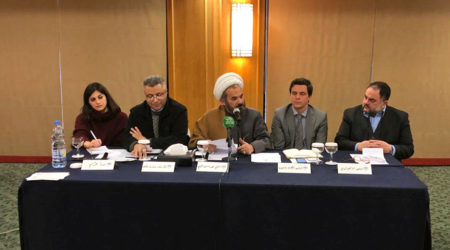The Cordoba Update 5/2017
|
The bi-weekly CORDOBA UPDATE is the product of continuous monitoring work, carried out by the Cordoba Foundation of Geneva team. By analysing and reporting on key events and trends in the Foundation’s areas of interest, we aim to draw readers’ attention to pertinent developments in North Africa, the Sahel, West Asia and Europe, which are not always covered in ‘mainstream’ media. In addition to sharing news from these four regions, the Cordoba Update is an opportunity for the Foundation to provide regular updates on its publications, events and other developments. In line with the programmes and projects funded by partners of the Cordoba Foundation of Geneva, updates and information are included under the following themes:
For questions and/or feedback regarding the content and form of the Cordoba Update, please contact Sarah Franck: sarah.franck@cordoue.ch Le CORDOBA UPDATE est un bimensuel qui présente le travail continu de suivi réalisé par l’équipe de la Fondation Cordoue de Genève. Par l’analyse des événements et tendances qui concernent les domaines d’intérêt de la Fondation, nous visons à attirer l’attention de nos lecteurs sur les développements pertinents en Afrique du Nord, dans le Sahel, en Asie de l’Ouest et en Europe, une actualité qui n’est pas toujours couverte dans les médias dits ‘traditionnels’. Outre le partage de l’actualité de ces quatre régions, le « Cordoba Update » est un moyen pour la Fondation de fournir des mises à jour régulières sur ses publications, événements et autres développements. En accord avec les programmes et projets financés par les partenaires de la Fondation Cordoue de Genève, les mises à jour et informations concernent les thèmes suivants :
Pour des questions et / ou des commentaires concernant le contenu et la forme du Cordoba Update, veuillez contacter Sarah Franck : sarah.franck@cordoue.ch |
ISLAMIST-SECULAR RELATIONS
Morocco, 20.03.2017: Mending Fences between Islamists and Leftists Unnerves the Palace
Over 129 professionals linked to the Islamist group Al Adl wal-Ihssane (AWI) have been victims of a wave of relocations and terminations, since last January. On 20 March 2017, a group of human rights activists, lawyers, and journalists gathered at the office of Moroccan Association for Human Rights (AMDH), in Rabat, in order to discuss the situation and agree a solidarity action plan. Notable leftist figures such as Khadija Riyadi, head of the AMDH, Fouad Abdelmoumni, secretary-general of Transparency International-Morocco, Ali Anouzla, editor of the famous news website Lakome2, and lawyers Abdelaziz Nouayidi and Abderrahim Benameur all deplored the massive termination decisions, and pledged solidarity with the victims. A committee, headed by Khadija Riyadhi, was formed by the leftist figures to support the professionals concerned. The terminations have included, so far, 93 education inspectors, headmasters, and principals; 15 civil servants from the ministry of agriculture, 5 in the finance sector; 4 in the transport sector, 5 in Telecoms, to name a few. The lawyers at the press conference explained that some decisions on relocation or termination had no legal basis, whereas others were justified by protecting the public interest. There even reports about cases of termination of professionals who are already in retirement. Not only professionals were concerned by the relocations and terminations, a number of AWI graduates who passed teaching certification exams and have started teaching this year have been suspended as well.
AWI and other analysts think that this wave of terminations is the Palace’s response to the renewal of rapprochement between AWI and leftist political parties and labour unions, over the last four months or so. In late December 2016, AWI invited figures of opposition leftist parties and trade unions to its annual conference marking the fourth anniversary of the passing of their leader Sheikh Abdessalam Yacine. The conference aimed at mending fences between AWI and leftists, who had joined their efforts during the 20 February Movement, in 2011, but thereafter had divergent positions. Leftists put on the table, again, the position of IWA in regard to their political change strategy, freedoms, civil state, and the shape of the state AWI seeks. Following this conference, attended by political and opinion figures from outside Morocco, AWI launched a series of public meetings on the theme: dialogue and the necessity of joint action, with opposition leftist political and civil society groups. Observers think the authorities have chosen this period of political power handover and the political vacuum left by the inability of political parties to form a coalition government in order to sanction the Adl wal-Ihssane group.
Links for more information:
http://telquel.ma/2017/03/20/vague-de-licenciements-des-militants-de-gauche
http://telquel.ma/2017/02/17/al-adl-wal-ihssane-denonce-une-purge-contre-ses-membres
https://goo.gl/UZHPZQ (press conference at AMDH, 20 Mar. 2017)
https://goo.gl/rJlKQd (Leftists-Islamists joint action dialogue meeting, Dec. 2016)
https://goo.gl/cQVT4X (AWI-leftists dialogue meeting, Tanja, 6 Jan. 2017)
https://goo.gl/xzmBHP (AWI-leftists dialogue, Fez, 9 Jan. 2017)
http://www.perspectivesmed.ma/le-pjd-prete-main-forte-al-adl
TRANSITION AND POLITICAL PARTICIPATION / TRANSITION ET PARTICIPATION POLITIQUE
Iraq, 8 – 13 March 2017: Political Collaboration Amid Tensions in the Lead-Up to Provincial Elections
The run-up to the provincial elections, slated to be held in Iraq in 2017, has been featuring political activities in different sectors of the polity. At the national level, the central government has been working to demonstrate its political credentials and regional influence, as seen in the recent comments by Iraq’s foreign minister, Ibrahim Al-Jaafari, during a press conference with the Secretary-General of the Arab League. Al-Jaafari stated that “Iraq has been working with Arab states to reduce the hotbeds of tension in the region, and expects them to stand with it in its war,” attempting to relate the current conflict in Iraq to regional developments. Similarly, on 13 March, the Speaker of the Iraqi Parliament, Saleem Al-Jubouri, called for a historic settlement between Arab states, removing “all forms of tension once and for all.” Al-Jubouri also framed his discourse in terms of wider regional developments outside of Iraq, insisting that “the region as a whole needs an agreement that removes all tension.” Their statements come as the battle against the so-called Islamic State appears to be making considerable progress, particularly in the symbolic recapture of Mosul. However, there are indications that the central government in Baghdad is wary of potential challenges to its control. As noted by sources, it is less clear “whether Haider Al-Abadi’s government will succeed in bringing Sunni factions into the political fold and address the country’s deep sectarian divisions.”
Writing for Middle East Monitor, one journalist noted that, particularly in Mosul, “there is still a feeling of deep distrust over the Shia-dominated security apparatus who are considered to be heavy-handed, sectarian and deeply corrupt.” The mutual mistrust between communities goes some way to explaining the concerns of key Sunni groups within the country as to their future role in Iraq. For example, Al Monitor reports that former members of the 2006 Sahwa are wary of the developments that will take place following the liberation of Mosul. In particular, these individuals recall numerous instances of assassinations and detentions of key figures of the Sahwa movement. Sources have reported a number of political moves by Sunni-affiliated groups in Iraq, in recent weeks. On 8 March, a trilateral Sunni coalition was reportedly formed after a number of prominent Iraqi figures met to discuss the future of Sunnis in the country, at a conference held in Ankara. The new political group has been dubbed the “Coalition of Iraqi National Forces”. However, cross-sectarian political alliances are also reportedly being explored by local actors. According to Rudaw, Sunni political parties have announced that they seek to build coalitions with Shia- and Kurdish-majority groups. Raad Dahlaki, a Sunni leader and member of the immigration committee at the Iraqi parliament, has stated that this alliance “will have international backing and support from Arab countries to secure “large participation” of “all forces” in the political process in Iraq.” Dahlaki reportedly stated that such collaboration would “not be based on religious or sectarian affiliations as it will include factions from all political and religious spectrums.”
Another political force that is expected to play a significant role in the 2017 elections are the Popular Mobilisation Units (PMUs) that have gained notable political power in their combat role against the Islamic State group. According to Niqash, “various militias had been negotiating alliances between themselves that they could capitalize on in upcoming Iraqi elections.” However, there appear to be significant challenges to establishing a common political project between groups of diverse ideologies and tactics. For example, the militia led by local cleric Muqtada al-Sadr have stated that they will pursue their own political project, seeking alliances with civil society groups that have taken part in protests against government corruption in Baghdad. However, militias that are perceived to be close to Iran, including the League of the Righteous, Hezbollah in Iraq, the Jund Al Imam brigades and Harakat al-Nujaba, have agreed on forming an alliance to contest elections. Brigades known to be close to Grand Ayatollah Ali-Al-Sistani, the architect of the PMUs, will not be entering into politics. Despite these political ambitions, Iraqi law prohibits political parties and entities with armed wings to run for election. These groups will be unable to take part in the upcoming provincial elections unless the controversial 26 November 2016 law is implemented. This legislation allows for the incorporation of the PMUs into the security apparatus, making these groups part of an official government body, under the direct supervision of the Prime Minister. If this change in the PMUs status does occur, they would no longer be considered armed groups, but rather an official component of the Iraqi security forces, thereby legitimating any party affiliations.
For a variety of sources on the topic, please see:
https://www.middleeastmonitor.com/20170316
https://www.middleeastmonitor.com/20170313
https://www.middleeastmonitor.com/20170309
http://www.al-monitor.com/pulse/originals/2017/03/qaede-isis-sawha-iraq
https://www.middleeastmonitor.com/20170310-sunni-coalition-formed-in-iraq
http://www.rudaw.net/english/middleeast/iraq/10032017
http://www.niqash.org/en/articles/politics/5536/Iraq
http://www.al-monitor.com/pulse/originals/2017/03/iraq-election
Egypt: 14-20.03.2017: War on journalism & the heavy civilian toll in Sinai
Government sponsored candidate Abdel-Mohsen Salama became the head of the journalists’ syndicate. Salama is the managing editor of state owned Al-Ahram newspaper, and at the top of his list of supporters is former National Security agent Ahmed Mousa, a notorious mouthpiece for the regime who was supposedly intentionally planted in Al-Ahram. “This recent development forecasts even darker times for an already gloomy era,” said Aya Nader, Egyptian independent journalist, in OpenDemocracy. She added that “the militarization of politics as well as authoritarianism are suffocating the people of Egypt. Public spaces are slowly but surely being securitized as the media is coopted. The economy is being divided like a pie to a select few, as a number of business tycoons and regime loyalists strategically buy out firms and distribute them among military men and their associates.” In addition, assets of Mostafa Sakr, owner of Daily News Egypt, Egypt’s only English independent daily print newspaper, and Arabic financial newspaper Al Borsa, were frozen. Sakr has been accused of belonging to the Muslim Brotherhood, branded by the Egyptian government as a terrorist organization. Although handed out abundantly, the accusation was even more ridiculous this time, as the regime had previously used the newspaper to seek out investors for its mega projects.
Human Rights Watch reported that Egyptian internal security forces waging a campaign in the Sinai Peninsula against an affiliate of the Islamic State may have extrajudicially executed at least four and perhaps as many as 10 men in January 2017. The security forces may have arbitrarily detained and forcibly disappeared the men and then staged a counterterrorism raid to cover up the killings. The organization’s investigation relied on multiple sources of evidence including documents, interviews with relatives, and an edited video of the purported raid made public by the authorities.
Maged Mandour, a political analyst and columnist, stated, in Sada/Middle East Analysis, that “extrajudicial killings in Sinai increased in 2016, according to the Nadeem Center for Rehabilitation of Victims of Violence, reaching 1,234 out of 1,384 extrajudicial killings across the country, constituting 89.2 percent of all cases documented.” He mentioned that within this number, the vast majority of cases (1,177) occurred in the North Sinai province, which includes the towns of al-Arish and Shiekh Zuweid, as well as Halal Mountain, the epicenter of the insurgency. Across Egypt, air raids were responsible for 451 of the cases reported, assassinations for 443 cases, deaths during sustained state operations for 368 cases, and artillery for 56 cases. The use of artillery and the air force therefore constitute 36.6 percent of all extrajudicial killings in Egypt. By comparison, in 2015, the total number of extrajudicial killings reached 328 nationwide, with air power and artillery claiming the lives of 43 individuals combined, or 13.1 percent of the total death toll.
Links for more information:
https://www.opendemocracy.net/arab-awakening/aya-nader/egypt-deep-state-s-war-on-journalism
https://www.hrw.org/news/2017/03/16/egypt-possible-extrajudicial-killings-sinai
http://carnegieendowment.org/sada/?fa=68296
Egypt, 03.16.2017: Legislating authoritarianism: Egypt’s new era of repression
“Egypt’s new authoritarian regime is rapidly closing the public space—cracking down on autonomous civil society and independent political parties, asphyxiating the practice of pluralist politics, and thwarting citizens’ peaceful and active engagement in public affairs,” said Amr Hamzawy, a senior researcher at Carnegie. He added that the government’s primary strategy is to institute wide-scale repression through lawmaking and justify its behavior through conspiratorial and populist narratives.
Among the elements of the regime’s strategy Hamzawy mentions:
- Empowering the military and intelligence and security services to control civil society with little oversight.
- Undemocratic laws are being used to rescind established notions of the rule of law and denigrate trust in the impartiality of public institutions.
- Vague, broad language in new and amended laws—such as the Protest Law, NGO Law, Penal Code, Terrorism Law, and Military Court Law—is enabling the regime to arbitrarily prohibit or criminalize activities without definition, make accusations of terrorism without legal restraint, and transfer civilians to military courts.
- With legal backing, scare tactics and police brutality are being used regularly to deprive citizens of their freedoms of expression and association.
- To justify its policies, the regime is propagating conspiracy theories, the defamation of opponents, and hate speech directed at voices of dissent.
- The government is also using religious and nationalistic narratives to elevate its ruler to the level of a moral paragon and savior and to counteract dissatisfaction with Egypt’s deteriorating conditions.
- This approach allows Egypt’s generals to claim that their policies are aligned with national interests and national security.
Hamzawy illustrated that such a strategy has many effects including:
- Debates about public affairs and politics have become permeated with incorrect information, fake news, and outright lies.
- Liberal and leftist parties have been once again either domesticated or marginalized in a formal political arena controlled by the security services.
- Viable opposition movements and civic activism have been severely hindered. Islamist movements, in particular, have been weakened. Human rights defenders and nongovernmental organizations have been pushed to the edge of extinction, in constant fear of government sanctions.
- Tens of thousands of people have been detained, imprisoned, tortured or killed by the security and intelligence services in the name of protecting the country’s stability.
Links for more information:
http://carnegieendowment.org/2017/03/16/legislating-authoritarianism-egypt
Maroc, 22.03.2017 : Nouvelle donne par décret royal
5 mois après les élections, le Maroc se trouve toujours sans gouvernement. C’est pourquoi, ayant nommé dans un premier temps l’ancien chef du gouvernement et secrétaire général du Parti justice et développement (PJD), Abdelilah Benkirane, pour former une nouvelle coalition, le roi, Mohammed VI, a pris la décision de le démettre de ses fonctions jeudi 16 mars 2017 par décret royal, suite à l’échec des négociations entre les différents partis politiques marocains. Le choix du roi s’est donc reporté sur le numéro 2 du même parti, Saad Dine El Otmani, qui succédera à Monsieur Benkirane et qui s’attèlera à la lourde tâche de former la prochaine coalition gouvernementale dans les plus brefs délais. Monsieur El Otmani, psychiatre de métier, fût le ministre des affaires étrangères sous l’ancien gouvernement de Benkirane, et est vu par le palais comme plus « pacifiste ». De son côté, le PJD, lors d’une réunion de son conseil national samedi 18 mars, a dégagé toutes responsabilités de Monsieur Benkirane pour l’échec des tractations évoquant les nombreuses concessions qu’avait accepté le premier ministre désigné.
A sa victoire en octobre 2016, le PJD avait pour but de reformer la même coalition qui était en place avant les élections, mais c’était sans compter les nouvelles demandes de deux des partis (le Rassemblement national des indépendants (RNI) et le Mouvement populaire (MP)) compris dans celle-ci qui ont réclamé l’inclusion de plus petits partis alliés. Devant le refus de Monsieur Benkirane, qui a évoqué des lignes rouges à ne pas dépasser, ces deux formations politiques ont tout simplement refusé l’offre de faire partie du gouvernement, bloquant ainsi toute issue positive.
Selon la presse locale, le roi a donc donné 15 jours à Monsieur El Otmani pour sortir de l’impasse politique dans laquelle se trouve le royaume Chérifien depuis 5 mois. Ainsi les tractations ont recommencé mardi 21 mars, avec la rencontre du nouveau chef du gouvernement désigné avec premièrement 3 représentants de l’Istiqlal (PI) puis Ilyas El Omari, secrétaire général du Parti authenticité et modernité (PAM) qui se trouve être le parti principal de l’opposition en ayant remporté la deuxième place au scrutin du mois d’octobre. Ce dernier a affirmé maintenir sa « position du 8 octobre » mais a salué la nouvelle stratégie de tractation et signalé que l’ouverture sur toutes les sensibilités politiques au Maroc devait se poursuivre. Monsieur El Otmani a ensuite rencontré Aziz Akhannouch, président du RNI au côté de Mohamed Sajid, secrétaire général de l’Union constitutionnelle (UC), puis Mohand Laenser, secrétaire général du Mouvement populaire (MP). Enfin, Monsieur El Otmani a rencontré Driss Lachgar, premier secrétaire de l’Union socialiste et des forces populaire (USFP), puis Nabil Benabdellah, secrétaire général du Parti du progrès et du socialisme (PPS).
Liens pour plus d’informations :
https://www.brookings.edu/blog/markaz/2017/03/02/morocco-the-kings-dilemma
http://www.aljazeera.com/news/2017/03/king-mohammed-vi-ousts-pm-abdelilah-benkirane
http://www.aljazeera.com/video/news/2017/03/moroccos-king-dismisses-prime-minister
http://www.aljazeera.com/video/news/2017/03/saad-eddine-el-othmani-named-morocco-pm
http://www.aljazeera.com/indepth/features/2017/03/saad-eddine-el-othmani-morocco-deadlock
http://www.bladi.net/maroc-nouveau-gouvernement
https://africapostnews.com/2017/03/21/maroc-un-gouvernement-tres-attendu
http://fr.le360.ma/politique/futur-gouvernement-des-leaders-du-pjd-tablent-sur-lechec-del-othmani
http://www.bbc.com/afrique/39339141
http://www.lemonde.fr/afrique/video/2017/03/21/maroc-saad-eddine-al-othmani-est-un-homme-consensuel
http://telquel.ma/2017/03/21/gouvernement-el-othmani-demarre-les-discussions-avec-listiqlal
http://telquel.ma/2017/03/21/rni-luc-soutiennent-el-othmani-veulent-donner-du-temps
RELATIONS BETWEEN COMMUNITIES OF DIFFERENT ETHNIC, CULTURAL AND RELIGIOUS AFFILIATIONS /
RELATIONS ENTRE COMMUNAUTÉS DE DIFFÉRENTES AFFILIATIONS ETHNIQUES, CULTURELLES ET RELIGIEUSES
Iraq, 5-16.03.2017: Communities in Sinjar, Tel Afar and Ninevah Seek Semi-Autonomous Self-Government
On 5 March, the Yazidi Independent Supreme Council, the Turkmen Rescue Foundation and Al-Rafidain (Two Rivers) Organization, representing Iraq’s Assyrian Christians, issued a joint statement calling for a semi-autonomous region in northern Iraq. Under their terms, this region would constitute three contiguous regions, each considered to be the homelands of one or more of these minorities. Sinjar is considered to be the homeland of the Yazidi, Tel Afar that of the Turkmen, and the Ninevah plain that of the Christian and Shabak communities, and others. According to observers, the proposal for a semi-autonomous region is a demonstrable attempt by Iraq’s minorities to extricate themselves from ongoing conflicts that have had devastating effects on their communities.
According to an Iraqi researcher, Saad Salloum, the proposal falls in line with the Iraqi Constitution, which provides minorities with “the right to autonomy or self-administration in sub-units of territory.” The proposal calls for a region free from racial or sectarian entrenchment, with democratic governance, focusing on the protection of heritage, culture and civilisation. The proposal also highlights the principle of dialogue with all Iraqi entities, and a policy of openness towards all political and social organisations within the new semi-autonomous region.
One representative, Ali Akram al Bayati, President of the Turkmen Rescue Foundation, explained in an interview that the new region will require “international protection for a certain time, as was previously offered to the KRG [Kurdistan Regional Government], along with empowerment and training of our local forces to prepare them to defend the borders of the new autonomous region.” Another representative agreed, Prįñčė Naif Dawoud, President of the Yazidi Independent Supreme Council, saying “the project would need the support of major world powers and the United Nations, especially in its early stages.”
In addition to this, an international Assyrian news agency has reported that, at the beginning of March, “Chaldean Syriac Assyrian (Christian) parties held a joint press conference… calling on Iraqi government to recognise their demands to create a Nineveh Plain Province.” Participants reportedly urged the UN Security Council to issue a resolution protecting these minorities, as well as for the UN Mission in Iraq (UNAMI) “to be given the right to monitor the security situation and rehabilitation efforts, reducing exploitation and preventing the imposition of hegemonic policies across the Nineveh Plain, through offices established for this purpose and the assignment of observers.”
For a variety of sources on the topic, please see:
http://www.al-monitor.com/pulse/originals/2017/03/rafedin-minorities-iraq
https://alrafideincoalition.wordpress.com/2017/03/07/national-coalition-for-al-rafidein-region
http://www.aina.org/news/20170314151100
Europe, 20.03.2017: Proposition de nouveaux programmes de formation des imams par les instances politiques en France et en Suisse
La formation des imams est un thème qui a fait l’actualité ces dernières semaines en France et en Suisse, notamment dans le canton de Genève. Ce dernier a en effet annoncé la création d’un cursus universitaire pour les imams déjà en exercice, sous la forme d’une formation continue. Interviewé par la Radiotélévision Suisse (RTS), F. Dermange, professeur d’éthique à l’Université de Genève (UNIGE), explique que cette formation permettra aux imams de mieux s’intégrer au cadre social dans lequel ils exercent. Cette formation, pensée par différents acteurs à savoir certaines communautés musulmanes genevoises, des experts étrangers et les instances de l’Etat de Genève et de l’UNIGE, aurait donc, selon F. Dermange, pour but de proposer une vision de l’islam plus facile à adapter aux valeurs suisses dans une perspective qui ne se veut pas militante mais scientifique et académique. Fidèle à sa Constitution de 2012, qui proclame que malgré le caractère laïque de l’Etat « les autorités entretiennent des relations avec les communautés religieuses », les institutions genevoises donnent, avec ce programme, une des premières applications concrètes de son texte constitutionnel.
Il est toutefois important de souligner que d’autres programmes existent déjà, comme dans le canton de Fribourg, où le Centre Suisse Islam et Société (CSIS), créé le 1er janvier 2015, se consacre à la recherche, à la formation de la relève scientifique et à la formation continue dans le domaine de l’islam et de la société. Pour Pierre Maudet, conseiller d’Etat chargé du département de la sécurité et de l’économie, le programme de l’UNIGE ne viendrait pas concurrencer les activités développées par le CSIS mais viendrait les compléter, offrant notamment une formation continue à un public plus large que celui du CSIS, qui propose en particulier des formations pour les aumôniers exerçant dans les prisons, les centres de requérants d’asile et hôpitaux. La formation continue dans le canton de Genève a été plutôt bien accueillie même si le contenu précis des programmes n’a pas encore été clairement communiqué pour le moment.
En France, la mise en place d’une formation pour les imams dans le cadre universitaire est également à l’étude. Le 16 mars 2017, un rapport a été rendu par Catherine Mayeur-Jaouen, historienne de l’islam, Mathilde Philip-Gay, juriste spécialiste de la laïcité, et Rachid Benzine, islamologue, dans le cadre de la Mission de réflexion sur la formation des imams, créée en 2015 suite aux attentats qui ont touché la France. Les auteurs de ce rapport, commandé par le gouvernement, ont notamment souligné le fait qu’il convenait de redonner un cadre solide à la formation des imams. Selon eux, les imams seraient en effet, pour le moment, formés majoritairement à l’étranger et dans le cadre de formations peu qualitatives. Ils pointent également du doigt une situation alarmante en France, où il n’existe plus aucun professeur d’islamologie depuis 2016. Ces experts proposent donc des formations plus structurées, plus poussées et plus approfondies qui mettraient l’accent sur l’étude scientifique et historicisée des textes ainsi que sur des échanges avec d’autres facultés enseignant des disciplines telles la laïcité, la psychologie, les sciences sociales dans le religieux, la philosophie, la gestion de conflit et de projet, entre autres. Comme dans le cadre de la formation suisse, cette formation ferait intervenir des professeurs d’université et des intervenants extérieurs.
La question de la formation des imams soulève une nouvelle fois le débat de la gestion des affaires religieuses par le politique. Dans une conférence à l’Université de Genève sur la thématique de l’Islam en Europe (12 octobre 2016), Yahd Ben Achour, juriste tunisien et futur intervenant extérieur dans le cadre de la formation continue à Genève, souligne qu’en effet les musulmans ont comme devoir de s’adapter au fonctionnement européen et à son ordre politique mais qu’il est également nécessaire de repenser la laïcité dans le contexte actuel. Selon lui en effet, « la laïcité passive, celle de la neutralité de l’Etat, n’est plus de mise » car, entre autres, « quand l’Etat adopte une stricte neutralité à l’égard des religions, il ouvre la voie à l’emprise de la communauté ». Il souligna qu’une implication de l’Etat dans la gestion de certaines questions religieuses comme l’édification de lieux de culte ou la formation de personnes compétentes à l’enseignement religieux, dans le cadre strict du respect des principes de l’ordre public européen et en particulier de la liberté de conscience, redonnerait à l’islam une chance de rayonnement en Europe et lui permettrait d’approfondir son héritage classique de la liberté. Concluant, et citant Jacques Le Goff, ceci favoriserait selon lui le passage du musulman de la situation « d’Autre » à « Concitoyen à part entière ».
Ainsi, il convient dès lors de problématiser la situation en France et en Suisse par la question suivante : comment la gestion de la formation des imams par le politique dans ces différents contextes s’inscrit-elle dans le cadre laïque européen traditionnel et qu’est-ce qui les distingue l’une de l’autre ? Pour Sylvain Odier, Directeur de l’organisation Horizon Parrhésia, une des différences fondamentales entre ces deux pays est que le Canton de Genève a été mandaté par les communautés musulmanes locales afin de mettre en place une formation continue et ce pour des imams déjà en exercice. Le Canton a donc répondu à une demande spécifique, ce qui n’est pas le cas en France. En effet, les experts mandatés par le gouvernement s’inscrivent dans le cadre de la Fondation de l’islam de France, créée officiellement le 8 octobre 2016 par le gouvernement Valls suite à la vague d’attentats des dernières années. Cette fondation reflète clairement l’approche sécuritaire du gouvernement et sa volonté de sécuriser l’islam de France. Cette « ouverture » vers la communauté musulmane ne saurait faire oublier que sous le mandat finissant de François Hollande la laïcité a toujours été comprise comme très strict, une laïcité qui refuse de collaborer avec les communautés religieuses.
Dans ce contexte, redynamiser la place de l’islam en Europe et notamment en France et en Suisse, dans une perspective de laïcité ouverte et donc plus entreprenante, permettrait un rééquilibrage positif de la place occupée par les différentes religions au sein de l’Etat.
Liens pour plus d’informations :
https://www.unige.ch/public/actualites/2016/12102016-lislam-en-europe
https://www.rts.ch/play/radio/forum/audio/la-nouvelle-formation-a-geneve-pour-les-imams-prend-forme
https://www.rts.ch/info/regions/geneve/8466990-geneve-ambitionne-de-lancer-une-formation-continue
https://www.ge.ch/legislation/rsg/f/s/rsg
http://www.unifr.ch/szig/fr
http://www.lemonde.fr/campus/article/2017/03/17/la-piste-des-universites-pour-mieux-former-les-imams
http://www.lemonde.fr/religions/video/2017/03/16/comprendre-la-laicite-en-france-en-trois-minutes
http://www.interieur.gouv.fr/Actualites/L-actu-du-Ministere/Formation-des-imams-et-des-cadres-religieux-musulmans
http://urbi-orbi-africa.la-croix.com/monde/france-propositions-permettre-formation-plus-diversifiee-imams
http://www.la-croix.com/Urbi-et-Orbi/Actualite/France/Les-universites-n-ont-pas-toutes-pris-conscience
http://www.la-croix.com/Archives/1996-11-28/Islam
http://www.horizonparrhesia.ch/
Liban, 07-21.03.2017 : Le Hezbollah et un climat de tensions croissantes
Les propos du président Michel Aoun en février dernier qui affirmait que le maintien d’un Hezbollah armé était un besoin pour l’Etat et que ce parti était un complément à l’armée nationale libanaise avaient provoqué de vives réactions de la part du Groupe international de soutien au Liban (regroupant les Etats-Unis, la France, la Grande-Bretagne, l’Allemagne, l’Italie et la Chine) aussi bien que de l’ambassadeur de l’Union européenne et des représentants du Secrétaire général au Liban et de la Ligue arabe. L’évolution du parti armé continue depuis à susciter des questions et des analyses divergentes.
Certains analystes soulignent le renforcement de la puissance militaire du Hezbollah par un perfectionnement de ses techniques de combat, développement qui a été accéléré par ses combats en Syrie, et donc l’occasion de se confronter à divers environnements de combats. Non seulement le Hezbollah, combattant au côté des Russes et des Iraniens en Syrie, développerait ses capacités technologiques par son recours de plus en plus accru aux drones par exemple, mais également ses capacités opérationnelles et stratégiques sur le terrain (attaque, occupation puis contrôle de territoires).
Un ancien officier des renseignements israéliens ne cache pas qu’Israël suit de très près cette évolution. Selon l’Institute for National Security Studies israélien, le Hezbollah aurait cette année devancé l’Iran en lui prenant le titre de plus grand danger pour le pays. Un regain de tension avec le voisin du sud s’illustre également par un échange de menaces entre le Hezbollah et le président libanais d’une part et Israël d’autre part le mois dernier. Parmi les déclarations de ce dernier, on peut noter celles du ministre de l’éducation, Naftali Bennett, qui affirme que le Liban retournerait au Moyen-Age en cas de guerre. En effet, M. Bennett s’appuie sur les récents propos du président pour valider la cible de toute infrastructure civile, le Hezbollah n’étant plus considéré comme un groupe à part, mais comme partie intégrante de l’Etat libanais, ce qui rendrait caduque la distinction entre civils et militaires. Le ministre tient cependant à présenter ses propos comme des avertissements afin de prévenir une nouvelle guerre, affirmant qu’il n’y a aucune intention d’attaque actuellement.
Dans son nouveau rapport, l’International Crisis Group met en garde le Hezbollah devant une situation qu’il serait difficile de gérer. Par exemple, le rapport souligne le rôle de ce parti dans l’exacerbation des tensions sectaires. Un clerc irakien, critique de cette attitude, en explique la cause par le besoin de mobilisation. En effet, selon ce dernier, loin du contexte de la résistance contre Israël, il aurait été difficile de lever des troupes pour aller en aide au président Assad, voire même à l’Iran. Ainsi, les arguments politiques ont cédé la place aux arguments sectaires et la mobilisation s’est faite à l’origine au nom de la protection de la mosquée Sayyida Zaynab. L’attitude du Hezbollah est en effet très contradictoire à l’égard de la question du sectarisme. Alors que le parti répète que ce qu’il mène en Syrie n’est pas une guerre sectaire, il qualifie pourtant sans distinction tous les combattants sunnites en Syrie de takfiris. Or alors qu’un jour, les différends politiques se négocient autour d’une table, il en va d’enjeux bien plus complexes pour concilier des cœurs déchirés par la fracture sectaire.
Liens pour plus d’informations :
http://www.middleeasteye.net/columns/falling-arab-consensus-michael-aoun-and-road-arab-summit
http://english.almanar.com.lb/189055
https://www.crisisgroup.org/crisiswatch/february-2017#lebanon
http://www.haaretz.com/israel-news/1.776419
http://www.middleeasteye.net/news/hezbollah-must-drop-sectarian-rhetoric-push-peace-save-credibility
http://www.middleeasteye.net/columns/special-offer-lebanon-time-travel-israeli-military
https://www.crisisgroup.org/middle-east-north-africa/eastern-mediterranean/lebanon/175
http://www.middleeasteye.net/news/analysis-hezbollah-enters-new-war-use-armed-drones-syria
https://www.middleeastmonitor.com/20170317-palestinian-and-lebanese-concerns-over-a-potential-war
http://www.middleeasteye.net/news/lebanons-jumblatt-affirms-son-taymour-political-heir
VIOLENT EXTREMISM AND THE WAR ON TERROR / EXTRÉMISME VIOLENT ET LA GUERRE CONTRE LA TERREUR
Egypt, Russia & U.S.A., 26.02-14.03.2017: Russia appears to deploy forces in Egypt, eyes on Libya role
Russia appears to have deployed special forces to an airbase in western Egypt near the border with Libya in recent days, U.S., Egyptian and diplomatic sources say, a move that would add to U.S. concerns about Moscow’s deepening role in Libya. The U.S. and diplomatic officials said any such Russian deployment might be part of a bid to support Libyan military commander Khalifa Haftar, who suffered a setback with an attack on March 3 by the Benghazi Defence Brigades (BDB) on oil ports controlled by his forces. The U.S. officials, who spoke on condition of anonymity, said the United States has observed what appeared to be Russian special operations forces and drones at Sidi Barrani, about 60 miles (100 km) from the Egypt-Libya border. Egyptian security sources offered more detail, describing a 22-member Russian special forces unit, but declined to discuss its mission. They added that Russia also used another Egyptian base farther east in Marsa Matrouh in early February.
Meanwhile, the top commander of American military operations in the Middle East said during a recent visit to Cairo that the United States wanted to resume a major military exercise with Egypt that President Barack Obama canceled in 2013 to protest the killings of hundreds of civilian protesters. “It is my goal to get that exercise back on track and try to re-establish that as another key part of our military relationship,” Gen. Joseph L. Votel, the head of the United States Central Command, told an Egyptian television interviewer. General Votel’s comments were made shortly after he met with Abdel Fattah al-Sisi and top Egyptian military and Defense Ministry officials.
The New York Times reported that even before Trump took office, Obama had agreed to resume the provision of major weapons systems, including F-16 fighter planes, M1A1 Abrams tanks and Harpoon missiles. The delivery of those systems by Obama was suspended in 2013 after the Egyptian military ousted Mohamed Morsi, Egypt’s first democratically elected president. But growing concern over the threat of militants in Sinai, many of whom have pledged loyalty to the Islamic State, as well as Egypt’s decision to buy weapons from Russia and France, led the Obama administration to reverse course. President Trump appears even less inclined to let Egypt’s dismal human rights record interfere with the security relationship between the two countries.
Links for more information:
https://www.nytimes.com/2017/02/26/world/middleeast/trump-al-sisi-egypt-military
http://www.reuters.com/article/us-usa-russia-libya-exclusive
U.S.A., 13.03.2017: Jobs, not bombs, will win the war on terror
Zuri Linetsky, a Truman Project national security fellow, wrote in Foreign Policy that new polling data indicate that it’s unemployment, not religion, fueling extremist groups like Boko Haram. He added that almost immediately after taking office, President Donald Trump’s administration hinted that it would “revamp and rename” the existing approach to “countering radical Islamic extremism.” At the same time, the president proposed a dramatic increase in military spending, paid for in part by deep cuts to the State Department and U.S. Agency for International Development (USAID) budgets. “The new Trump strategy seems to assume that America’s enemies are motivated by Islam and the best way to fight them is with military might.” he said. Both assumptions are dangerously wrong-headed. Take Nigeria, where Boko Haram is currently waging the third-deadliest insurgency in the world. The group may have pledged allegiance to the Islamic State, but survey data collected in the three Nigerian states most affected by Boko Haram (Borno, Adamawa, and Yobe) show that Islam is not a major factor in motivating recruits. Unemployment, not religiosity, is the best predictor of support for the terrorist group. The presence of visible USAID programs, meanwhile, coincides with lower levels of support for Boko Haram. Taken together, these findings suggest that diplomatic soft power — rather than the hard power emphasized in the early days of Trump’s presidency — is the key to weakening terrorist groups. In other words, slashing State Department and USAID spending to pay for military efforts to defeat the Islamic State and like-minded groups could have precisely the opposite effect.
Linetsky concluded that the Trump administration is right to target radical extremist organizations around the globe, because these organizations are responsible for horrifying levels of death and destruction. But how it goes about countering these groups matters a great deal. The United States cannot blindly chase a “radical Islamic” boogeyman, a fact that Trump’s own national security advisor, H.R. McMaster, seems to have acknowledged in private. Bombing campaigns like the one currently underway in Yemen — or the sale of arms to military partners like Nigeria — cannot by themselves defeat extremist groups or their ideologies.
Hassan Hakimian, Director of the London Middle East Institute and Reader in Economics at SOAS, University of London, argued that the sixth anniversary of the Arab Spring uprisings this year came and went largely unnoticed. Unlike in previous years, there was no torrent of commentary about the tumultuous events that shook the Arab world and seemed to promise a transformation of its politics. He added that on the eve of their downfall, few Arab autocrats were actually being lauded by the World Bank and International Monetary Fund for their supposed success in adopting the “right” economic policies. The World Bank’s subsequent mea culpa is a clear indication that there may have been a problem with the policies they had prescribed for the Arab ancien régimes.
According to Hakimian, a failure to anticipate political revolutions reflects, at least partly, conceptual inadequacies. Mainstream economics tends to focus on the equilibrium-seeking behavior of homo economicus, guided by rational choice, when marginal benefits equal marginal costs. That conceptual framework is demonstrably ill equipped to deal with social and political upheavals, which can hardly be described as marginal changes. He concluded that the Arab Spring suggests that improved economic performance cannot be viewed as an insurance policy against political instability. Learning that lesson that may help us avoid being blindsided by future political upheaval. It might even enable us to avoid the kind of disappointment and despair that the Arab Spring has brought.
Links for more information:
http://foreignpolicy.com/2017/03/13/this-poll-proves-that-trumps-counterterrorism-strategy
https://www.project-syndicate.org/commentary/arab-spring-economic-forecasting-failure
The views and perspectives contained in the Weekly Update are from individual contributors and external sources, and do not necessarily reflect the opinions or position of the Cordoba Foundation of Geneva. The links are neither intended as an endorsement of particular publications nor the only source for the updates, but to connect to information in the public domain, for those interested in background or further details.
